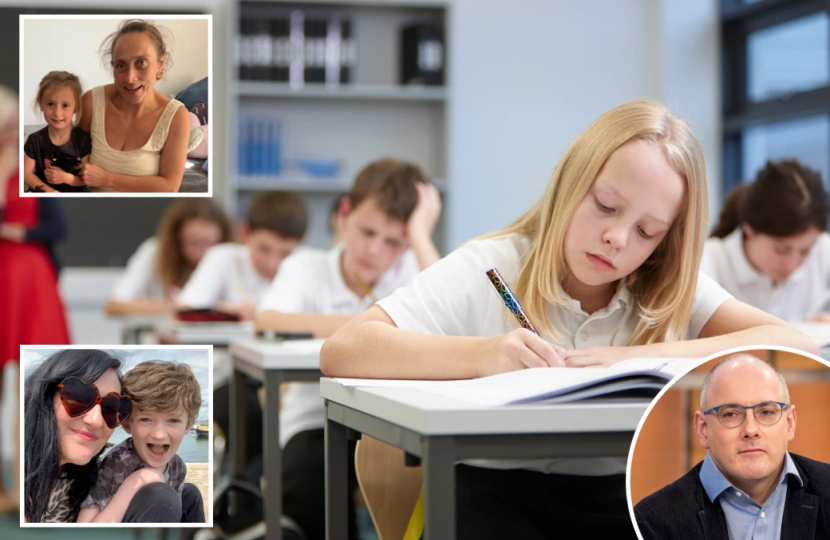
First published in The Sun:
WHITE working-class kids have been let down by schools for decades, and woke phrases such as “white privilege” are making it worse.
There you go. I said it. The sky didn’t fall in. The world didn’t implode.
It may make some people uncomfortable. Some may feel the need to reach for their Twitter account and have a go at me and the education committee that has made this finding.
But they are in denial. Let me prove it. Here are just some of the facts.
Nearly one million white, working- class pupils from disadvantaged backgrounds struggle with their education at all stages, from when they first pick up a book to when they leave school.
Just 53 per cent of white British kids on free school meals hit their expected targets when they are four or five. This is one of the lowest figures for any ethnic group.
Things only get worse the older they get.
At GCSEs, just 17.7 per cent of white working-class kids get a grade 5 (the equivalent of the old C) in maths and English. Again, they lag behind their classmates.
And just 16 per cent of these kids end up at university or in another type of higher education, the lowest of any ethnic group apart from Travellers of Irish heritage and Gypsy/Roma people.
At every stage they underperform compared to almost every other ethnic group or cohort.
This has come about from decades of neglect, lame excuses and lazy thinking.
Ask why these stats are so bad and the prospects of these kids so poor and you get the same stock response: It is down to poverty.
Yet if poverty is the only reason, why is it that children from other ethnic communities but similarly disadvantaged backgrounds do much better?
The Government cannot just offer more of the same. And the educational establishment cannot just explain this away by blaming poverty alone. We must do better, and aim higher.
There are many complex reasons why white working-class boys and girls struggle at school.
For some, it will be because they come from families who, over many generations, have clocked off from education. Their mums and dads may have hated school, dropped out early, not seen the point.
Funding is also a problem. Governments have spent decades chucking cash at big cities, yet the towns where white working-class communities live are too often forgotten about and left behind.
There are few youth and community groups in these towns that encourage learning and bring people together. Scout huts have closed and the church pews are increasingly empty.
Without this support, no wonder so few white working-class kids go on to university. So what should be done?
The first thing is the narrative needs to change. For too long discussing this subject has been a taboo.
Misguided concepts such as white privilege are growing ever prevalent.
Barnardo’s lectures its parents about white privilege on its website, but it would be better to focus on looking after disadvantaged children.
Cash-strapped local councils are spending their dwindling reserves on these lessons, while cutting back on core work such as social care.
Even the National Association of Teachers of Religious Education recommends lessons in white privilege to children as young as eight.
This is wrong-headed for a number of reasons.
First, it implies collective guilt, rather than saying an individual should be responsible for racism.
Second, it tells poor white communities that they are privileged when they are not.
You tell a single mum struggling to bring up three kids in a bedsit in my constituency of Harlow in Essex that they are a beacon of “white privilege” and they will rightly laugh in your face. But don’t be surprised if they get angry too.
Third, it is just factually incorrect given the underperformance of white working-class children compared to other ethnic groups. All it does is pit group against group. This has got to be stopped.
It is sad that many people who haven’t even properly read the report seek to condemn it out of hand and sweep the problems with the term white privilege under the carpet. They don’t even want to debate the issue.
It is yet another reason why white working-class boys and girls have suffered so long in schools. This has become a taboo subject.
But no longer. Our committee has suggested a number of policies that can change things for good.
First, funding. This must be tailormade — more cash needs to go to the most disadvantaged schools, rather than a one-size-fits-all approach.
Second, parents should be supported with a family hub in every town and programmes should be set up to engage parents with schools and their kids’ education.
Third, we need a curriculum that is much richer in skills. Design and technology should be added to the EBacc of GCSEs pupils are encouraged to take, and schools should be made to offer a route into vocational work if they want to get a good Ofsted rating.
To boost take-up of degrees, we should offer students the opportunity to do degree apprenticeships, where they earn while they learn, have no student debt and get a skilled job at the end.
And to attract the good teachers to these struggling schools we need to shake up the way we recruit them. Ministers should introduce a new apprenticeship so teachers can get a teaching degree while learning on the job, in the classroom.
This is not just about spending more money — it is about spending it wisely.
This has been a taboo subject for far too long. Our report must be a wake-up moment.
We must never again deny one million white working-class boys and girls the chance to climb the ladder of education opportunity.
